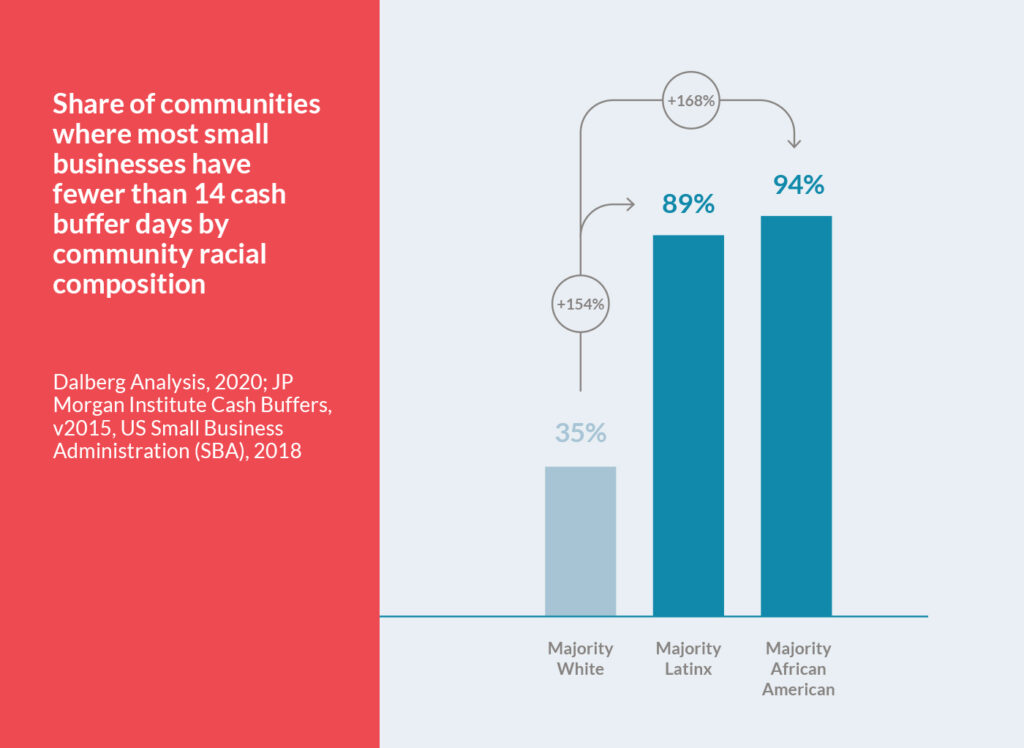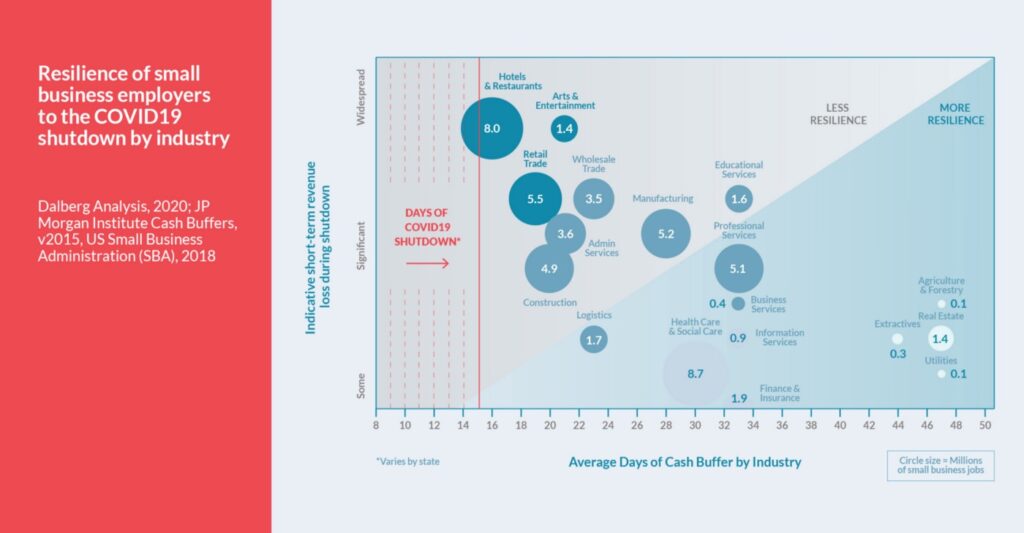Dalberg uses cookies and related technologies to improve the way the site functions. A cookie is a text file that is stored on your device. We use these text files for functionality such as to analyze our traffic or to personalize content. You can easily control how we use cookies on your device by adjusting the settings below, and you may also change those settings at any time by visiting our privacy policy page.
Local, state, and federal governments are mobilizing support, but if benefits are not delivered equitably to SMEs, polarization and inequality will increase as the crisis progresses — and last long after it has ended. This Dalberg-authored white paper shows how to address the unique needs of minority-owned small businesses.
The COVID-19 pandemic and its socioeconomic shockwaves are unprecedented in our lifetimes. Most businesses in the country will be in some way affected, and few are well-positioned to weather the storm. Local, state, and federal governments are mobilizing support, but if benefits are not delivered equitably, polarization and inequality will increase as the crisis progresses — and last long after it has ended.
Through analysis and conversations, we at Dalberg have been tracking the trajectory of what recovery could look like in the U.S. Among the small business owners we’ve spoken to, those affected by closures are feeling beholden to landlords, burning through savings, and wary of taking on new loans. Many have laid off their entire workforce. Keeping their businesses afloat through this crisis will require unprecedented measures.
It’s clear from speaking with these business owners that a one-size-fits all recovery will not work. A diversity of businesses run by people from a variety of backgrounds and economic situations demand more. And America’s smallest businesses — those employing 20 or fewer people — will be the hardest hit. These businesses are disproportionately minority-owned and operate with substantially smaller cash buffers. This is also true of small businesses of all sizes operating in majority African American and Latinx communities. According to a recent study by the JP Morgan Chase Institute, over 90% of such businesses have cash buffers of fewer than 14 days. By contrast, small businesses in majority white neighborhoods are better positioned — just 35% have such small cash buffers.

Some, like Michael Brady, the executive director of the Third Avenue Business Improvement District in New York City’s South Bronx neighborhood, predict that without substantial relief, 50% of retail stores with less than 20 employees could be gone within three weeks.
The outsized risk to businesses in minority communities is real, and it is why Dalberg has developed four straightforward principles to guide an equitable approach to small business recovery across the U.S.
1. BEND EXISTING SYSTEMS, DON’T LET THEM BREAK
“Non-essential” businesses in large swaths of the country have been closed for nearly two weeks with no end in sight. With April rent due and payroll looming, a staggering number are teetering on the brink.
The smallest businesses in the hardest hit segments — restaurants, bars, and retail — are most vulnerable. Without substantial assistance, many of these establishments — and a commensurate portion of the 20 million jobs they represent — will disappear.

There is no time to build from scratch. Initially, we must intervene wisely, and use existing systems to provide immediate relief to these businesses. They need eviction and foreclosure moratoriums, rent forgiveness, loan forbearance, cash grants and more. The CARES Act, signed into law last Friday, is a huge step. Complementary state and local actions also play a key role. Still, more assistance will be needed. John Perkins, the owner of Juniper Restaurant in St. Louis, which remains open for takeout only, described the urgency he is feeling,
It’s like hiking up a mountain in the winter — you want to lay down in the snow, but your partner is like ‘don’t do it, you’ll never wake up again.’ I feel like we are at that moment — if I close the restaurant, will I ever turn the lights back on?
2. OFFER GRANTS, IN ADDITION TO LOANS
Building the crisis response and recovery around loan programs alone will significantly disadvantage the smallest and minority-owned businesses. Integrating robust small business grants into any further stimulus would provide more equitable results.
Even in normal times, minority-led small businesses are 30% less likely to apply for loans and are three times more likely to fear being denied. Add to this the stifling economic uncertainty of the current moment and it’s no wonder the owners we spoke with had mixed feelings about low, zero interest, and even forgivable loans like those to be issued under the CARES Act’s new Paycheck Protection Program. Given their current inability to forecast or plan, these entrepreneurs are not confident they can use the money productively and are wary of forgivability clauses. Some have never managed a business with debt. Pepe Kehm, the owner of Peno Italian Soul Food in St. Louis, Missouri expressed this concern,
Some of the other stuff you mentioned like trying to get loans, grants, and other things, I’ve never done because I’ve never had to. I’m sure people do and they are good at that, but I’m not one of them.
We estimate that the $350B allocated to the Paycheck Protection Program, while massive, can cover only a quarter of the total potential demand from businesses. A first come, first served disbursement approach will disproportionately flow to larger businesses that have access to sophisticated law and accounting firms. Smaller businesses will need more hands-on assistance, and as a result, many will struggle to access the first tranche of support before funds run out.
3. PROVIDE SIMPLE & STREAMLINED ACCESS TO SUPPORT
Programs must be easy to understand and access. There are now dozens of different economic bailout and recovery programs. Dan Snyder, founder of Corridor, a boutique clothing design and retail company based in NYC, doesn’t worry about the complexity: “We’ll be applying for everything. I have a retail accountant who will tell me what to do.” But others cannot afford such advice and will struggle to stay up to date with assistance programs while simultaneously trying to reinvent their businesses.
Moreover, women-owned small businesses may disproportionately struggle to navigate this web of support. Our own research shows that women have significantly less time to dedicate to work than men, given the heavier burden they carry in terms of unpaid household and family care work. This is exacerbated by social distancing with children home from school and elderly relatives unable to help. Lise Epperlein Mulderig, owner of CaptureShowroom, a wholesale clothing showroom in Manhattan, explained,
I’m all of a sudden filling a role that I never actually wanted — this full-time stay at home mom who’s home-schooling her children, while trying to keep her business from imploding.
To ensure equity, policymakers need to simplify their programs to the maximum extent possible, in some cases sacrificing efficiency to maximize reach. National and state networks of small business assistance centers must also accelerate efforts to help less sophisticated businesses meet requirements and access programs.
4. BUILD TOWARD A MORE EQUITABLE, SUSTAINABLE & RESILIENT FUTURE
It’s a good wake up call for all of us to reinvent how we live and work and consume. Hopefully, when it starts again, we’ll take some lessons from this pandemic and not start all over again with the same mistakes.
Alexis Jacot, owner of MIAM cafe in Miami
We have a once in a generation opportunity to transition toward a more equitable and sustainable future. We can strengthen the smallest businesses by helping them implement basic technology and build emergency planning into their operational models. We can also mitigate some of the environmental costs of doing business and accelerate our transition to a more sustainable future by investing in sectors that reduce our carbon footprint and generate new engines for growth.
It is clear that the worst impacts of COVID-19 are yet to come. At the very least, we must learn its hard-fought lessons and work toward a better and more equitable future.
Download the full whitepaper here.
Join us
Dalberg is actively looking to partner with private, public, and philanthropic actors to advance action toward a more equitable recovery for small business. For further details and to discuss collaborations, please contact Michael Mori (michael.mori@dalberg.com) and Ben Wise (ben.wise@dalberg.com).






